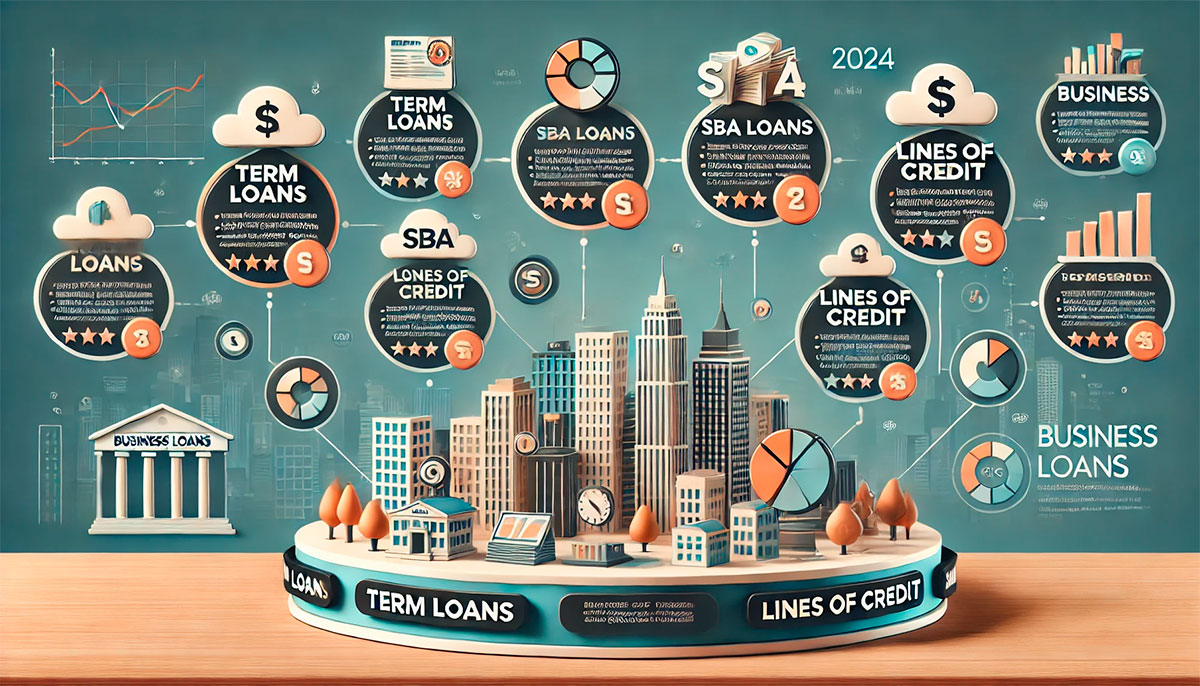As we move into 2024, businesses are presented with a variety of financing options to support growth, innovation, and operational needs. Whether you’re a startup seeking initial funding or an established company looking to expand, understanding the different types of business loans available can help you make informed financial decisions. Each loan type comes with its own terms, requirements, and advantages, making it crucial to select the right option based on your specific business goals. In this article, we’ll explore the most common types of business loans available in 2024 and how they can benefit your business.
Term Loans
A term loan is one of the most traditional forms of business financing. It provides a lump sum of money that you repay over a set period, typically with fixed monthly payments and a fixed interest rate. Term loans are often used for major business investments such as purchasing equipment, expanding into new markets, or making large capital improvements.
One of the key advantages of term loans is their predictability. The fixed repayment schedule makes it easy to budget for monthly payments, while the loan terms can range from short-term (one to five years) to long-term (up to 25 years), depending on your business needs. While term loans are commonly offered by banks, online lenders are also becoming popular in 2024, often providing faster approval processes with more flexible terms.
Small Business Administration (SBA) Loans
SBA loans continue to be a popular option for small businesses in 2024. These loans are backed by the U.S. government, which reduces the risk for lenders and makes it easier for small businesses to qualify. SBA loans offer some of the most favorable terms in the market, including lower interest rates, longer repayment periods, and smaller down payments compared to traditional loans.
The most well-known type of SBA loan is the SBA 7(a) loan, which is ideal for general business purposes such as working capital, debt refinancing, and purchasing real estate or equipment. The SBA 504 loan is another option, specifically designed for long-term investments in fixed assets like land, buildings, or machinery. These loans are particularly attractive for businesses looking for significant capital with manageable monthly payments.
Business Lines of Credit
A business line of credit is one of the most flexible financing options available in 2024. Unlike a traditional loan, a line of credit gives you access to a pool of funds that you can draw from as needed. You only pay interest on the amount you use, and once you repay the borrowed amount, you can borrow again within the same credit limit.
This revolving nature makes business lines of credit ideal for businesses with fluctuating cash flow or seasonal needs. They are often used for short-term operational expenses such as inventory purchases, payroll, or emergency repairs. Many businesses in 2024 are turning to lines of credit for their flexibility and ease of access, allowing them to manage cash flow more efficiently without taking on unnecessary debt.
Equipment Financing
For businesses that rely heavily on machinery, technology, or vehicles, equipment financing is a smart option. This type of loan is used to purchase new or upgrade existing equipment, with the equipment itself serving as collateral. Equipment financing loans are typically easier to qualify for because the lender has the security of repossessing the equipment if the loan is not repaid.
Equipment financing loans are especially beneficial for businesses in industries such as manufacturing, construction, or healthcare, where costly machinery is essential for operations. In 2024, many businesses are opting for equipment loans as a way to keep up with technological advancements without draining their working capital.
Invoice Financing
Invoice financing, also known as accounts receivable financing, is a type of loan that allows businesses to borrow against outstanding invoices. In other words, if your business is waiting for clients to pay invoices, you can use invoice financing to access those funds sooner. This can be a valuable solution for businesses experiencing cash flow gaps due to delayed customer payments.
Invoice financing is often used by companies that operate on longer payment terms, such as 30 or 60 days. It provides immediate cash flow without having to wait for clients to settle their accounts. As 2024 sees more businesses dealing with extended payment cycles, invoice financing is becoming increasingly popular for maintaining liquidity and ensuring smooth operations.

Merchant Cash Advances
A merchant cash advance (MCA) is not a loan in the traditional sense but a financing option that allows businesses to receive upfront capital in exchange for a percentage of future sales. This type of financing is particularly suited to businesses with steady credit card sales, such as retail stores, restaurants, and e-commerce businesses.
In 2024, merchant cash advances remain a viable option for businesses that need quick cash but may not qualify for traditional loans. The repayment is based on a percentage of daily sales, so payments fluctuate with your revenue. However, it’s important to note that MCAs often come with higher fees and interest rates compared to other forms of financing, so they should be used carefully.
Microloans
Microloans are small, short-term loans designed to help startups or small businesses with lower capital needs. These loans are often offered by nonprofit organizations or community lenders and can be used for various purposes, such as purchasing inventory, equipment, or working capital.
In 2024, microloans are especially appealing to newer businesses that may not yet qualify for larger loans. With loan amounts typically ranging from $500 to $50,000, microloans provide a lifeline to entrepreneurs who need modest funding to get their ventures off the ground. Additionally, microloans often come with more flexible credit requirements and supportive resources, such as mentoring and business education programs.
Commercial Real Estate Loans
For businesses looking to purchase, develop, or refinance commercial property, a commercial real estate loan is the go-to option. These loans are used to finance office buildings, retail spaces, warehouses, or any other type of commercial property. In 2024, commercial real estate loans continue to be a major source of funding for businesses looking to expand or improve their physical locations.
Commercial real estate loans typically have longer terms, often ranging from 10 to 25 years, with either fixed or variable interest rates. These loans require a down payment, and the property itself serves as collateral. With the increasing demand for commercial spaces in various sectors, real estate loans remain a critical tool for business expansion.
Conclusion
As 2024 unfolds, businesses have a wide array of loan options available to support their growth, operations, and long-term success. From traditional term loans and SBA-backed financing to flexible lines of credit and equipment-specific loans, each type of business loan offers distinct advantages tailored to various needs. Understanding the differences and benefits of each option is key to selecting the best financing solution for your company.
By leveraging the right type of loan, you can secure the necessary capital to fuel innovation, expand into new markets, and meet your business goals. Careful planning and consideration will ensure that you use these financial tools effectively, positioning your business for a successful future.


